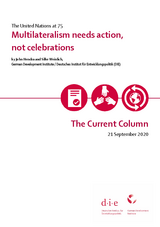The Current Column
The United Nations at 75
Multilateralism needs action, not celebrations
Hendra, John / Silke WeinlichThe Current Column (2020)
German Development Institute / Deutsches Institut für Entwicklungspolitik (DIE), The Current Column of 21 September 2020
One sentence stands out prominently in the political declaration on the United Nations’ 75th anniversary: “We are not here to celebrate. We are here to take action.” The 193 UN Member States are expected to adopt this motion today. In light of the many ills that have recently befallen the world, and the world’s organisation, this statement seems promising, if not poignant.
If you take the Covid-19 pandemic as a test-case for the world’s collective ability to respond effectively to global problems, so far, we flunked it. Fierce competition among nations has far too often been the response instead of global coordination, multilateral cooperation and solidarity. UN institutions in place to deal with such a crisis – like the World Health Organisation – while effective, have been hampered by regulatory, political and financial constraints. Neither the Security Council nor the General Assembly have responded to the pandemic with the urgency required. What’s more, other relatively new and much heralded structures such as the G20 have been found to be just as wanting and subject to the same toxic (geo-)politics. This should be, unfortunately, no big surprise given the overall insufficient responses to equally pressing global crises, such as biodiversity loss, climate change, or growing inequalities and injustices within and among nations. Collective action at the global level is difficult, the more so when it requires the transformation of behaviour and redistribution of resources. Nationalism, populism, geopolitical rivalries and a sense of multilateral fatigue have not made it any easier.
While all this is sobering, we should not overlook the UN’s many significant achievements over the past 75 years in keeping the peace, facilitating impressive development gains, advancing human rights and saving lives when catastrophe strikes. The final results of UN75’s year-long “global conversation” with over a half-million people will also be released today. They will undoubtedly reinforce widespread belief around the world that enhanced global cooperation is, indeed, absolutely vital. So, can the 75th anniversary then be an opportunity to set out a much-needed path to reinvigorated multilateralism and the United Nations itself? Multilateralism is not only about confronting global risks; it is also about identifying global opportunities for action. Let us mention but three.
First, there is an urgent need for convincing narratives that can show both decision makers and the broader public, why multilateralism is worth preserving and transforming. Far too often multilateralism is perceived as being too remote from the needs of “We, the peoples”, the inspiring opening lines of the Charter of the United Nations. As many national governments as possible could use the 75th as the kick-off to review their own national multilateral policies. Germany’s Foreign Office is doing this with its white paper “Weißbuch Multilateralismus”, bringing in the views of many stakeholders.
Second, more robust multilateral responses must take precedence in the immediate future. Regarding Covid-19, this means that vaccine development and access to vaccines have to be treated as a global public good that is rolled out equitably to those most at risk. There must be greater solidarity in addressing the socio-economic impact of the pandemic. Here, Canada, Jamaica and the UN have stepped into the breach. Together they highlight the financing required to get back on a path towards the Sustainable Development Goals (SDGs) – and countries need to respond. We must also move from the rhetoric to the reality of “building back better”. More ambitious pledges for climate action are needed. Overdue updates to the Nationally Determined Contributions (NDCs) must become instrumental in shaping economic recovery measures so as to achieve carbon neutrality by 2050. The pandemic has stimulated significant behaviour change around the world which will need to accelerate if we are to stave off an even more existential climate crisis.
Third, despite a complex political context, further UN reforms must be tackled. The 75th anniversary declaration gives the UN Secretary-General the mandate to come back to the General Assembly within a year with recommendations on global challenges and reform proposals. It is critical that the Secretary-General be given the space, resources and intellectual firepower required to mobilise the innovative thinking and inspiration needed – and that he also receives political backing in his endeavours. In the spirit of “inclusive multilateralism”, the policy process going forward should build on specific proposals that were developed in the run-up to the UN’s 75th by civil society actors, think tanks, parliaments, and others – and that the door remains open for much more.
As Member States themselves declare today: “we are here to ensure the future we want, and the United Nations we need.” It’s high time to get on with it.
John Hendra is a former UN Assistant Secretary-General with the UNDG, and UN Women, and is a former UN Resident Coordinator in Vietnam, Tanzania and Latvia. He continues to provide advice on sustainable development issues and UN development system reform through his consulting practice and is also currently an Associate Researcher with German Development Institute / Deutsches Institut für Entwicklungspolitik (DIE).
Silke Weinlich is a senior researcher with the research programme “Inter- and Transnational Cooperation” at the German Development Institute / Deutsches Institut für Entwicklungspolitik (DIE).


